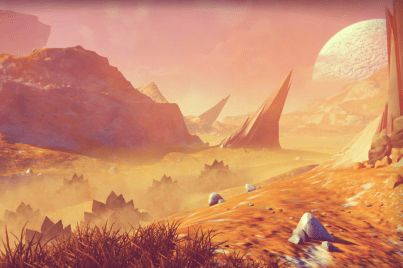March 13, 2016
A team of programmers has built a self-generating cosmos, and even they don’t know what’s hiding in its vast reaches.
Here, in a dim room half an hour south of London, a tribe of programmers sit bowed at their computers, creating a vast digital cosmos. Or rather, through the science of procedural generation, they are making a program that allows a universe to create itself.
The ambitious project will be released as a video game this June under the title No Man’s Sky. In the game, randomly-placed astronauts isolated from one another by millions of lightyears must find their own existential purpose as they traverse a galaxy of 18,446,744,073,709,551,616 unique planets.
“The physics of every other game—it’s faked,” the chief architect Sean Murray explained. “When you’re on a planet, you’re surrounded by a skybox—a cube that someone has painted stars or clouds onto. If there is a day to night cycle, it happens because they are slowly transitioning between a series of different boxes.” The skybox is also a barrier beyond which the player can never pass. The stars are merely points of light. In No Man’s Sky however, every star is a place that you can go. The universe is infinite. The edges extend out into a lifeless abyss that you can plunge into forever.
On the monitor before us, cryptic fragments of source code flash by. While earthly physicists still struggle to find a unified mathematical framework for all phenomena—the No Man’s Sky equivalent already exists. Before us are the laws of nature for an entire cosmos in 600,000 lines.
The universe begins with a single input, an arbitrary numerical seed—the phone number of one of the programmers. That number is mathematically mutated into more seeds by a cascading series of algorithms—a computerized pseudo-randomness generator. The seeds will determine the characteristics of each game element. Machines, of course, are incapable of true randomness, so the numbers produced appear random only because the processes that create them are too complex for the human mind to comprehend.
Physicists still debate whether our own universe is deterministic or random. While some scientists believe that quantum mechanics almost certainly involves indeterminacy, Albert Einstein famously favored the opposing position, saying, “God does not play dice.” No Man’s Sky does not play dice either. Once the first seed number is entered into the void within the program, the universe is unalterably established—every star, planet, and organism. The past, present, and future are fixed indelibly, with change to the system only possible from a force outside the system itself—in this case, the player.
In one sense, because of the game’s procedural design, the entire universe exists at the moment of its creation. In another sense, because the game only renders a player’s immediate surroundings, nothing exists unless there is a human there to witness it.
Read more at: http://www.theatlantic.com/technology/archive/2016/02/artificial-universe-no-mans-sky/463308/

Στα συνεδρια των συγγραφέων Ε.Φ κάνουν ασκήσεις δημιουργίας νέων κόσμων ξεκινώντας κοσμογραφικα, γεωγραφικά, εξωβιολογία, ανάπτυξη κοινωνιών κ.λ.π.